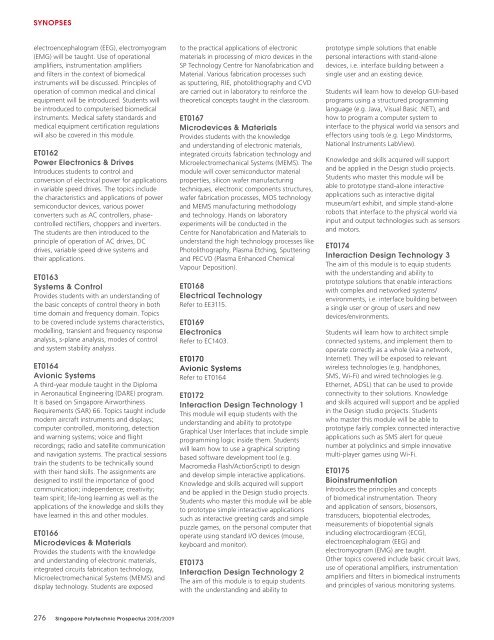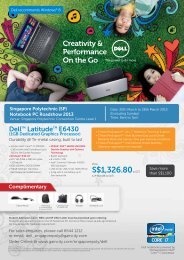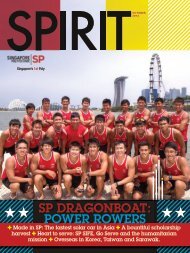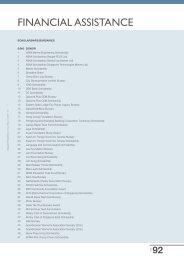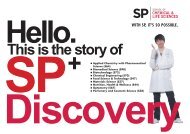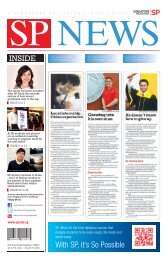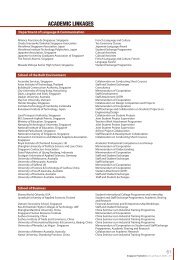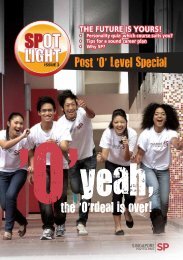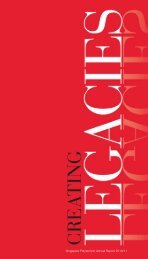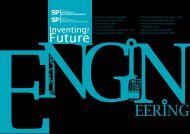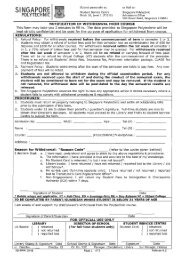SYNOPSES - Singapore Polytechnic
SYNOPSES - Singapore Polytechnic
SYNOPSES - Singapore Polytechnic
Create successful ePaper yourself
Turn your PDF publications into a flip-book with our unique Google optimized e-Paper software.
<strong>SYNOPSES</strong>electroencephalogram (EEG), electromyogram(EMG) will be taught. Use of operationalamplifiers, instrumentation amplifiersand filters in the context of biomedicalinstruments will be discussed. Principles ofoperation of common medical and clinicalequipment will be introduced. Students willbe introduced to computerised biomedicalinstruments. Medical safety standards andmedical equipment certification regulationswill also be covered in this module.ET0162Power Electronics & DrivesIntroduces students to control andconversion of electrical power for applicationsin variable speed drives. The topics includethe characteristics and applications of powersemiconductor devices, various powerconverters such as AC controllers, phasecontrolledrectifiers, choppers and inverters.The students are then introduced to theprinciple of operation of AC drives, DCdrives, variable speed drive systems andtheir applications.ET0163Systems & ControlProvides students with an understanding ofthe basic concepts of control theory in bothtime domain and frequency domain. Topicsto be covered include systems characteristics,modelling, transient and frequency responseanalysis, s-plane analysis, modes of controland system stability analysis.ET0164Avionic SystemsA third-year module taught in the Diplomain Aeronautical Engineering (DARE) program.It is based on <strong>Singapore</strong> AirworthinessRequirements (SAR) 66. Topics taught includemodern aircraft instruments and displays;computer controlled, monitoring, detectionand warning systems; voice and flightrecordings; radio and satellite communicationand navigation systems. The practical sessionstrain the students to be technically soundwith their hand skills. The assignments aredesigned to instil the importance of goodcommunication; independence; creativity;team spirit; life-long learning as well as theapplications of the knowledge and skills theyhave learned in this and other modules.ET0166Microdevices & MaterialsProvides the students with the knowledgeand understanding of electronic materials,integrated circuits fabrication technology,Microelectromechanical Systems (MEMS) anddisplay technology. Students are exposedto the practical applications of electronicmaterials in processing of micro devices in theSP Technology Centre for Nanofabrication andMaterial. Various fabrication processes suchas sputtering, RIE, photolithography and CVDare carried out in laboratory to reinforce thetheoretical concepts taught in the classroom.ET0167Microdevices & MaterialsProvides students with the knowledgeand understanding of electronic materials,integrated circuits fabrication technology andMicroelectromechanical Systems (MEMS). Themodule will cover semiconductor materialproperties, silicon wafer manufacturingtechniques, electronic components structures,wafer fabrication processes, MOS technologyand MEMS manufacturing methodologyand technology. Hands on laboratoryexperiments will be conducted in theCentre for Nanofabrication and Materials tounderstand the high technology processes likePhotolithography, Plasma Etching, Sputteringand PECVD (Plasma Enhanced ChemicalVapour Deposition).ET0168Electrical TechnologyRefer to EE3115.ET0169ElectronicsRefer to EC1403.ET0170Avionic SystemsRefer to ET0164ET0172Interaction Design Technology 1This module will equip students with theunderstanding and ability to prototypeGraphical User Interfaces that include simpleprogramming logic inside them. Studentswill learn how to use a graphical scriptingbased software development tool (e.g.Macromedia Flash/ActionScript) to designand develop simple interactive applications.Knowledge and skills acquired will supportand be applied in the Design studio projects.Students who master this module will be ableto prototype simple interactive applicationssuch as interactive greeting cards and simplepuzzle games, on the personal computer thatoperate using standard I/O devices (mouse,keyboard and monitor).ET0173Interaction Design Technology 2The aim of this module is to equip studentswith the understanding and ability toprototype simple solutions that enablepersonal interactions with stand-alonedevices, i.e. interface building between asingle user and an existing device.Students will learn how to develop GUI-basedprograms using a structured programminglanguage (e.g. Java, Visual Basic .NET), andhow to program a computer system tointerface to the physical world via sensors andeffectors using tools (e.g. Lego Mindstorms,National Instruments LabView).Knowledge and skills acquired will supportand be applied in the Design studio projects.Students who master this module will beable to prototype stand-alone interactiveapplications such as interactive digitalmuseum/art exhibit, and simple stand-alonerobots that interface to the physical world viainput and output technologies such as sensorsand motors.ET0174Interaction Design Technology 3The aim of this module is to equip studentswith the understanding and ability toprototype solutions that enable interactionswith complex and networked systems/environments, i.e. interface building betweena single user or group of users and newdevices/environments.Students will learn how to architect simpleconnected systems, and implement them tooperate correctly as a whole (via a network,Internet). They will be exposed to relevantwireless technologies (e.g. handphones,SMS, Wi-Fi) and wired technologies (e.g.Ethernet, ADSL) that can be used to provideconnectivity to their solutions. Knowledgeand skills acquired will support and be appliedin the Design studio projects. Studentswho master this module will be able toprototype fairly complex connected interactiveapplications such as SMS alert for queuenumber at polyclinics and simple innovativemulti-player games using Wi-Fi.ET0175BioinstrumentationIntroduces the principles and conceptsof biomedical instrumentation. Theoryand application of sensors, biosensors,transducers, biopotential electrodes,measurements of biopotential signalsincluding electrocardiogram (ECG),electroencephalogram (EEG) andelectromyogram (EMG) are taught.Other topics covered include basic circuit laws,use of operational amplifiers, instrumentationamplifiers and filters in biomedical instrumentsand principles of various monitoring systems.276 <strong>Singapore</strong> <strong>Polytechnic</strong> Prospectus 2008/2009


